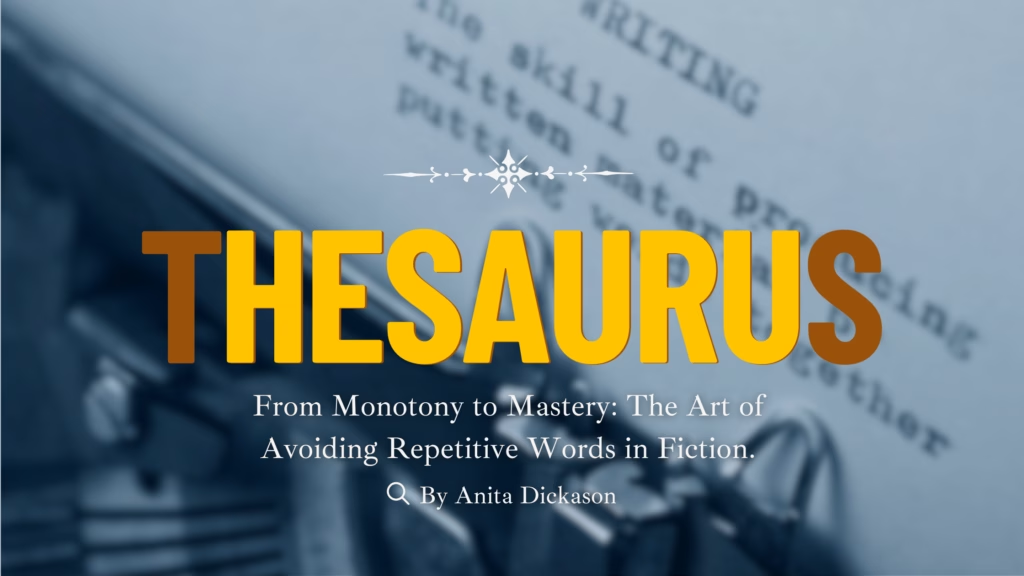From Monotony to Mastery: The Art of Avoiding Repetitive Words in Fiction. A Mystery Review Crew Spotlight on Writing with a Thesaurus.
Have you ever perused the pages of a book in a bookstore and then set it aside? Or browsed the sample pages of an online novel, only to move to another selection because something about the story didn’t grab your interest? Repetitive language could have been the culprit.

*Affiliate links are used in this article. The Mystery Review Crew is an Amazon Affiliate and, as such, earns from qualifying purchases. See our privacy policy and disclosures for more information.
The repeated use of words and phrases can significantly hinder a reader’s experience and undermine the quality of the narrative. When authors rely on the same words and phrases too frequently, it creates a monotonous reading experience that quickly disengages readers. Authors risk making their characters feel tedious and unremarkable by failing to provide varied descriptions of scenes, characters, and dialogue.
Finding the right word, the perfect word, to describe a situation without repeating oneself can often lead to hours of frustration as you write and rewrite a scene, agonizing over the best word choices.
My FBI Tracker crime thriller, Sentinels of the Night, has an excellent example of the vexing redundancy of a word. The scene is set against the backdrop of FBI Tracker Cat Morgan discovering a body and the ensuing police investigation.
Excerpt:
Cat studied the parking lot. A low concrete wall separated it from an adjacent strip shopping center. A driveway connected the back of the property to an alley. Other than a few parked cars and a dumpster in the back corner, it was empty.
A sound, the screech of owls, grew in intensity. They landed on the edge of the dumpster. She stared at them for a couple of minutes, hoping they would move. They didn’t. Damn! Resigned, she grabbed a flashlight and rubber gloves from her car.
As she approached the container, she glanced up at the birds, who stared back. Motionless, they looked like twin statues. “God, I hate searching through garbage. And why … is it always a commercial bin, one that holds oodles of waste?” she grumbled.
They blinked in unison, followed by their strange, clacking sound.
“Yeah, I know—don’t kill the messenger. You didn’t put her in here.”
During Cat’s phone call to her new boss and her interaction with a skeptical patrol officer, a suspicious homicide detective, and a hostile police chief, the dumpster is a significant detail. Had I used ‘dumpster’ every time Cat or another character referenced it, the reader would have encountered the word twenty-six times, detracting from the primary focus of the escalating tension between Cat and the other characters.
The solution to my dilemma was a thesaurus and synonyms—receptacle, bin, container, trash bin, and commercial bin.
While ‘dumpster’ was unusual, everyday words are frequently overused. Consider the word ‘walk.’ How often is it used to describe a character moving from one place to another? Overusing it can become excessive and monotonous. An author’s reliance on ‘walk’ is a missed opportunity to enrich the narrative by vividly describing the character’s movements and emotional state.
Here are some alternatives: stroll, stride, saunter, wander, march, shuffle, glide, trudge, skip, dash, scurry, hurry, trot, navigate, move, approach. These are just a few of the many synonyms that can replace ‘walk.’ Although these words are related, each evokes a vastly different image.
For example, ‘stroll’ suggests a leisurely, relaxed pace. In contrast, ‘march’ suggests brisk, determined steps. ‘Wander’ conveys an impression of an aimless, unhurried movement. ‘Saunter,’ slightly different, conveys a casual, more confident manner.
Which of these would a reader enjoy more?
She walked along the path.
She skipped along the path, excitement radiating with every step.
She walked through the dimly lit alley.
She moved like a shadow through the dimly lit alley.
Weary from the long day, he walked home.
Weary from the long day, he trudged home.
She walked to the kitchen.
Her shoulders hunched, she shuffled to the kitchen.
Using synonyms is a powerful technique to elevate a scene and captivate a reader’s attention. Employing a thesaurus can significantly enhance any writing project or writing assignment, regardless of the author’s skill level. Unlike a dictionary, which provides definitions and proper grammatical usage, a thesaurus offers similar words. Both are essential for effective writing but serve different purposes.
The Start of the Thesaurus
The thesaurus has been around for nearly two hundred years. In 1840, an English physician and philologist, Peter Mark Roget, retired from a successful medical career. The rest of his life was spent finalizing Roget’s Thesaurus of English Words and Phrases, a project he started in 1805. His first edition was published in 1852. It featured 15,000 words, and only 1,000 copies were printed. Since 1852, Roget’s Thesaurus of English Words and Phrases has never been out of print, though there are numerous updates. The current edition contains 443,000 words.
The idea of a national holiday for a thesaurus may initially seem eccentric. Still, it underscores this unpretentious reference book’s significant impact on language and writing. January 18 is National Thesaurus Day, honoring the author, Peter Mark Roget, born on January 18, 1779.
Despite its widespread acclaim as a valuable resource to writers, opinions on the validity of using a thesaurus vary. Critics argue that relying on a thesaurus can alter the author’s voice and should not be used merely to appear clever. They advocate for its sparing use. Even Stephen King emphasized this point, stating, “Any word you have to hunt for in a thesaurus is the wrong word. There are no exceptions to this rule.”
While some criticisms may hold merit, the value of a thesaurus to an author outweighs these concerns. Authors can choose words that more accurately and vividly describe scenes, emotions, and actions. By offering a variety of synonyms, a thesaurus enhances sensory details and character expression, enabling writers to find the perfect words to convey ideas and concepts.
A simple change can make a meaningful difference and enhance the narrative, keeping the reader engaged. A synonym can capture a nuance that your original word missed. The intrinsic value of a thesaurus is to help authors make their writing more interesting and engaging. While a thesaurus is only one of the editing tools in an author’s arsenal, it’s one of the most powerful. A thesaurus is a doorway to a vast array of synonyms, empowering authors to articulate their thoughts more effectively, creatively, and with greater variety. A writing journey that will keep the story fresh and free of repetitive language.
Whether you’re writing the next great American novel, a science fiction epic, or tackling your latest writing assignment, tools like the “Emotion Thesaurus” by Angela Ackerman and Becca Puglisi or Robert W. Bly’s writer’s guide can point you in the right direction. Successful writers use reference books to elevate their craft, making them invaluable resources for every writing project. Additionally, online thesauruses, such as Power Thesaurus, provide a convenient and effective way to find the right word without flipping through printed books.





